Avoiding Sermon Mistakes!
In this humorous guide, Alyce McKenzie and John Holbert provide helpful and practical advice for avoiding the common mistakes that many preachers make in their 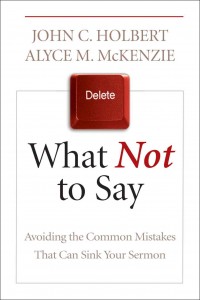 sermons. Useful for preachers, students, and teachers alike, What Not To Say addresses how to use language about God, how to use stories in preaching, and what not to say (and what to say) in the beginning, middle, and end of sermons.
sermons. Useful for preachers, students, and teachers alike, What Not To Say addresses how to use language about God, how to use stories in preaching, and what not to say (and what to say) in the beginning, middle, and end of sermons.
Endorsements
“Holbert and McKenzie have drawn on their years of experience teachign the art of preaching and have created a book that is not only smart and full of practical wisdom, it is also witty and a delight to read. Their of “things not to do” and “things to do” in sermons are so down to earth and practical, one almost forgets how deeply rooted they are in good theology and solid homiletical theory.” – Thomas G. Long, Bandy Professor of Preaching, Candler School of Theology, Emory University
“Wise and winsome, Holbert and McKenzie offer practical guidance for preachers who would like to avoid the most common pitfalls of preaching. You may laugh, sigh, or moan, but every preacher will recognize himself or herself somewhere amid the eight humor filled chapters that address what not to say as well as offer helpful and positive examples of what to say about God. Scripture, others, oneself, stories, and the beginning, middle and end or sermons.” – Dawn Ottoni Wilhelm, Professor of Preaching and Worship, Bethany Theological Seminary, Richmond, Indiana.
“In spite of our earnest efforts, preachers are sometimes guilty of defamation of God’s character and reckless endangerment of people’s unsuspecting ears. In this book, veteran homileticians Holbert and McKenzie help preachers repent of our pulpit misdeeds, or avoid them in the first place. With remarkable clarity and disarming humor, they tell us what not to say. In praise of their work, let me tell you what to do- read this book!” – Brad R. Braxton, Distinguished Visiting Scholar, McCormick Theological Seminary.
Buy What Not to Say from Cokesbury Buy What Not to Say from Amazon
Creatively Crafting Sermons
Fiction writers are highly creative people who have learned the discipline of translating their ideas into effective communication. That same combination of creativity and skill comes into play for preachers crafting their sermons. Novel Preaching is a lively and accessible exploration of how fiction writers approach the task of writing 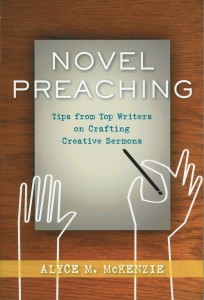 novels: how they develop ideas, find their inspiration, and turn the spark of a creative notion into words on paper that will captivate the masses. I show how preachers can use the same techniques to enhance their own creativity and to turn their ideas into powerful, well-crafted sermons. Novel Preaching offers a wealth of advice from successful fiction writers, including Isabelle Allende, Frederick Buechner, Julia Cameron, Annie Dillard, Natalie Goldberg, Stephen King, Toni Morrison, Joyce Carol Oates, and Melanie Rae Thon, and also includes several of my sermons as samples.
novels: how they develop ideas, find their inspiration, and turn the spark of a creative notion into words on paper that will captivate the masses. I show how preachers can use the same techniques to enhance their own creativity and to turn their ideas into powerful, well-crafted sermons. Novel Preaching offers a wealth of advice from successful fiction writers, including Isabelle Allende, Frederick Buechner, Julia Cameron, Annie Dillard, Natalie Goldberg, Stephen King, Toni Morrison, Joyce Carol Oates, and Melanie Rae Thon, and also includes several of my sermons as samples.
Endorsements: Buy Novel Preaching from Cokesbury Buy Novel Preaching from Amazon
“McKenzie, aware that our culture is hungry for savvy faith but quickly bored by religious charter, turns to novelists for help in the preaching craft. To our delight, while McKenzie urges preacher to attend to life around us, to exercise our imaginations, and to summon startlingly fresh language, she model before our eyes those very virtues.” – Thomas G. Long, Bandy Professor of Preaching, Candler School of Theology, Emory University, Atlanta, Georgia
“In this fresh and helpful book, Alyce McKenzie invites novelists and preachers in to a richly textured conversation and uncovers habits, perspectives , and tools that have the potential to change the reader’s practice of preaching. This is not just a book of “hints and helps for preachers.’ It is a challenge to rethink preaching as an act of biblically-centered, inspired imagination.” – John S. McClure, Charles G. Finney Professor of Homiletics and Chair of the Graduate Department of Religion, Vanderbilt Divinity School, Nashville, Tennessee
Empowerment for Wise Leadership
Pastors are called to an exciting ministry of proclamation and leadership. That excitement, however, often turns to demoralization and burnout as pastors become increasingly uncertain of what their role is supposed to be. Competing claims by the congregation, the denomination, and society about who and what the pastor is 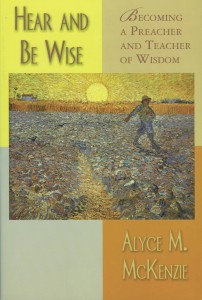 supposed to be breed confusion and disappointment. Are they primarily managers? Therapists? Fundraisers? A way out of this confusion lies in reclaiming the biblical understanding of who the pastor is. One of the biblical roles within the pastoral vocation that often goes neglected is that of wise teacher or sage. Scripture presents as a model of pastoral leadership those who interpret the word and will of God for daily living. Especially in their preaching, pastors are called to help the congregation understand their place in God’s world.
supposed to be breed confusion and disappointment. Are they primarily managers? Therapists? Fundraisers? A way out of this confusion lies in reclaiming the biblical understanding of who the pastor is. One of the biblical roles within the pastoral vocation that often goes neglected is that of wise teacher or sage. Scripture presents as a model of pastoral leadership those who interpret the word and will of God for daily living. Especially in their preaching, pastors are called to help the congregation understand their place in God’s world.
In Hear and Be Wise, I introduce the four qualities of the wise teacher–the bended knee, the listening heart, the cool head, and the courageous voice–and encourage pastors to make each of these integral to their ministry and vocation. I demonstrate that the sermon is the prime opportunity to function in the role of wise teacher. I also include strategies for applying biblical wisdom to all areas of everyday life:
- Preaching that is as sensory as life is; using imagery, metaphor, simile, and story to connect with people’s emotions as well as their intellect.
- Preaching that uses first-person experiences without being narcissistic.
- Preaching that teaches without boring.
- Preaching on public, often controversial issues that minimizes defensiveness and maximizes dialogue.
Endorsements: Buy Here and Be Wise from Amazon
“Alyce McKenzie has written an accessible, practical, user-friendly book on the pastoral and theological resources concerning the wisdom traditions of the Bible. Those traditions, as she makes clear, have a practical, direct interface with current issues in faith and minstry. They particularly serve in a more or less secular context where more traditional articulations of faith are problematic. Readers will be led to new discernments through her study.” – Walter Brueggemann, Columbia Theological Seminary, Decatur, Georgia
“Here preachers will find excellent ideas for series of sermons on everyday topics. McKenzie draws rich wisdom and instpiration from biblical scholarship and other sources that will please and nourish the soul. – Paul Scott Wilson, Professor of Homiletical, Emmanuel Colelge, University of Toronto
How Can We Best Preach and Teach Wisdom?
The shelves at the big bookstore chains advertisements across the web are full of cracker-barrel wisdom manuals, such as Don’t Sweat the Small Stuff and Life’s Little Instruction Book. Schools display brightly colored, slogan-filled posters to help them teach “the six pillars of character.” Many people are going to their local New Age 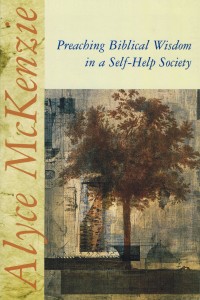 emporium to purchase energy-harmonizing crystals and to sign up for past-life regression seminars.
emporium to purchase energy-harmonizing crystals and to sign up for past-life regression seminars.
This is a new flurry of an old activity: the search for wisdom, for help in finding the principles that can guide our lives and shape our character. The question for those who proclaim the gospel is simple: by whose wisdom will our people live?
The wisdom books and genres of the Bible, long neglected, are now the subject of avid scrutiny by biblical scholars. They’ve turned up the shining insight that the Bible, both Old and New Testaments, is brimming with materials that axe the ancestors of contemporary slogans and self-help manuals. This is indeed good news! We have proverbs and instruction every bit as vivid and compelling as “Don’t sweat the small stuff” — and far more aware of the depth, complexity, and mystery of life in God’s world.
In Preaching Biblical Wisdom in a Self-Help Society, I focus on how Proverbs, Ecclesiastes, and other biblical wisdom can provide fruitful opportunities to preach to those who are hungry for wisdom, and often unaware of the richness and depth of the Bible’s wisdom tradition. This book:
- Provides an alternative to shallow catch-phrases that parade in our culture as wisdom;
- Helps preachers harvest the biblical gems that are the ancestors of contemporary slogans and self-help manuals;
- Lets preachers tap into a rich vein of instruction on life that has withstood the test of theological reflection and life experience.
Endorsements: Buy Preaching Biblical Wisdom from Cokesbury Buy Preaching Biblical Wisdom from Amazon
“After describing the hunger of many contemporary people for wisdom, Alyce McKenzie shows that wisdom traditions in the Bible fill the emptiness in the pit of the contemporary stuff. Each chapter brings the false wisdom of our self-help socierty into dialogue with the true wisdom of biblical traditions. This volume is an indispensable aid for lectionary preaching.” –Ronald J. Allen, Nettie Sweeney and Hugh Th. Miller Professor of PReaching and New Testament, Christian Theological Seminary
“What has faith to do with wisdom? Is wisdom different from self-help? Can I compose a sermon out of one line of scripture? If you have asked yourself any of these questions, you will delight in the wise and practical cousel of Alyce McKenzie: Wosdom is God’s self-expression, an essential antidote to wahat ails our culture, and an important source for preaching.” -Paul Scott Wilson, Professor of Homiletics, Emmanuel College, University of Toronto
Proverbial Wisdom for the Pulpit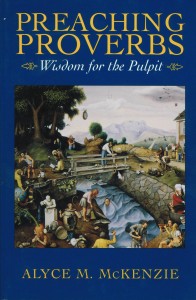
Proverbs abound in contemporary culture and in biblical texts. But surprisingly, the use of proverbial wisdom is conspicuously absent in the contemporary pulpit.
Preaching Proverbs offers preachers an effective way to reclaim proverbs in preaching. Throughout the book, I correct popular misconceptions about the nature of proverbs, highlight their usefulness in contemporary situations, and demonstrate their ability to confirm (or subvert) the status quo. I present not only Old Testament examples from Proverbs and Ecclessiastes, but also the way in which Jesus used subversive sayings in his ministry.
Key areas include:
- Definitions about what makes proverbs work and shows what they do;
- Showing how proverbs both confirm and subvert order;
- Six sermons to illustrate proverbs at work in dealing with contemporary concerns;
Endorsements: Buy Preaching Proverbs from Cokesbury Buy Preaching Proverbs from Amazon
“Alyce McKenzie writes as a passionate and engaged preacher, determined to resurrect the power of proverbial wisdom for our religious lives. This book will open up whole new worlds of homietical form and design for any preacher who takes it seriously.” –Christine M Smith, Professor of Preaching and Worship, United Theological Seminary of the Twin Cities
“A virtual catalogue of proverbs with a wise word for any occasion, this book will be a hospitable friend to the lonely preacher.” -Tex Sample, Robert B. and Kathleen Rogers Professor Emeritus of Church and Society, Saint Paul School of Theology, Kansas City, Mo